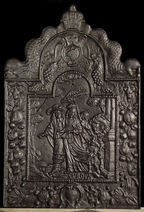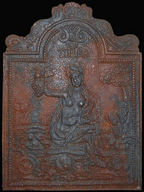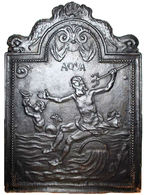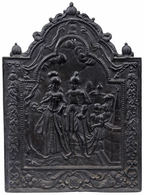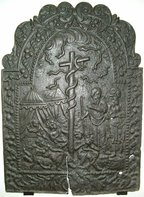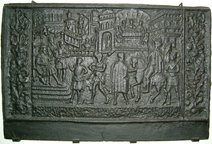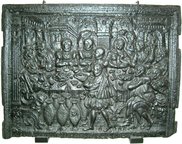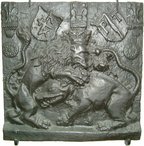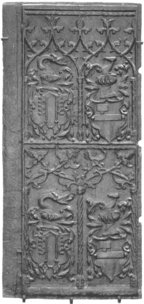-
720
Description: Arched rectangular central panel with bead-on-fillet edging, pictorial representation of a man and woman walking, behind the woman a child holds her train and a young person carries a parasol; from behind a column on the right, a horse's head is visible, a tree stands to the left, at the foot of the scene is the word 'EVROPA'; tall-arched rectangular border with fillet edging; at top of arch, a lion's head above a ring, with descending grape vines on each side; at each side, a festoon of fruit suspended on a ribbon from a lion's head; at the bottom, an oval cartouche between flowers; on top, a Holy Roman Imperial crown between two descending dolphins.
Notes: The pictorial scene is based on an engraving c.1642 of Friedrich Wilhelm, Elector of Brandenburg, and his wife, Luise Henriette of Oranje-Nassau, by Mathias Czwiczek; one of series of firebacks depicting allegories of the four continents.
Copies of this fireback are known.
Inscription: EVROPA
- Decoration tags:
- 'Dutch' (shape)
- fillet (edging)
- whole carved pattern
- pictorial
- architectural
- text
- humans
- plants
Manufactured: in the mid- to late-17th century in the Siegerland area of Germany.
Current location: not known.
- Attached to series:
- 'Dutch' Miscellaneous Firebacks
- 'Dutch' Continents firebacks
-
948
Description: Arched rectangular shaped central panel with bead edging; seated, semi-naked female figure, with laurels leaves about her head, holding a bunch of grapes in her raised right hand; she is sitting on a stool; to her right is what appears to be a pile of stones; to her left a vase of tulips with a tree behind; above centre, is the word TERRA (earth - Latin); above is a swag of drapery enclosing a scallop shell; outside the panel is a narrow border of the same shape with fillet edging; the fireback is surmounted by a scallop shell between two outward-facing sea serpents.
Notes: One of a series of four designs of the classical elements of Earth, Air, Fire and Water.
Copies of this fireback are known.
Inscription: TERRA
- Decoration tags:
- 'Dutch' (shape)
- whole carved pattern
- pictorial
- allegorical
- text
- humans
- plants
Manufactured: in the mid- to late-17th century possibly in the Siegerland area of Germany.
Current location: not known.
- Attached to series:
- 'Dutch' Miscellaneous Firebacks
- Elements firebacks
-
947
Description: Arched rectangular shaped central panel with bead edging; naked figure of Poseidon/Neptune holding a a trident in his raised left hand, his right arm extended; he is sitting on a bridge over a flowing stream; to his right a merman, half immersed, blows a shell trumpet; above centre, is the word AQUA (water - Latin); above is a swag of drapery enclosing a scallop shell; outside the panel is a narrow border of the same shape with fillet edging; the fireback is surmounted by a scallop shell between two outward-facing sea serpents.
Notes: One of a series of four designs of the classical elements of Earth, Air, Fire and Water.
Copies of this fireback are known.
Inscription: AQUA
- Decoration tags:
- 'Dutch' (shape)
- fillet (edging)
- whole carved pattern
- pictorial
- mythological
- allegorical
- text
- humans
- objects
Manufactured: in the mid- to late-17th century possibly in the Siegerland area of Germany.
Current location: not known.
- Attached to series:
- 'Dutch' Miscellaneous Firebacks
- Elements firebacks
-
984
Description: Arched rectangular central panel with additional arch above; bead and fillet edging; pictorial scene of, on the left, a tree next to a female and, in the centre, a male figure, both in eastern dress, a page behind holding a train, and to the right a short obelisk surmounted by a crescent, behind which is the head of a figure with a camel; behind is a small building also surmounted by a crescent, with clouds above; the word, ASIA, is centre bottom; identical shaped border with cavetto-moulded edging; a pomegranate on top with descending swags of drapery; at the sides, overlapping bunches of foliage suspended from ribbon bows; at the bottom, a central cartouche between fruit bunches; on top, a pomegranate with a descending serpent on each side, and a pomegranate on each shoulder of the plate.
Notes: A pastiche of the EUROPA design based on an engraving c.1642 of Friedrich Wilhelm, Elector of Brandenburg, and his wife, Luise Henriette of Oranje-Nassau, by Mathias Czwiczek, with the figures adopting very similar poses in an oriental setting; one of series depicting allegories of the four continents, in this instance Asia. A recasting.
Copies of this fireback are known.
Inscription: ASIA / MB
- Decoration tags:
- 'Dutch' (shape)
- fillet (edging)
- whole carved pattern
- pictorial
- allegorical
- monogram
- text
- animals
- humans
Manufactured: in the mid- to late-17th century possibly in the Siegerland area of Germany.
Current location: not known.
- Attached to series:
- 'Dutch' Arched arch types
- 'Dutch' Continents firebacks
-
726
Description: Arched rectangular central panel with bead-on-fillet edging; pictorisl scene of a central cross-shaped pillar entwined with a snake; two pavilions to the left with human figures lying before them; two standing figures to the right, one holding a staff; above, clouds with snakes descending from the sky; arched rectangular border with fillet edging; on each side, descending festoons of fruit entwined with ribbon; at the bottom, a central cartouche between palm fronds; on top, foliate swirls.
Notes: The scene is an illustration of the plague of serpents visited upon the children of Israel by God (Numbers 21: 6).
Copies of this fireback are known.
Manufactured: in the mid-17th century possibly in the Siegerland area of Germany.
Current location: Victoria & Albert Museum, Cromwell Road, Kensington & Chelsea, Greater London, England.
Museum number: 291-1893 (part of the Victoria & Albert Museum museum group)
Citation: Anon., 2 Dec 1905, 'Old Kent and Sussex Fire-backs', Country Life, pp. 767-768.
- Attached to series:
- 'Dutch' Miscellaneous Firebacks
- Old Testament & Apocrypha firebacks
-
729
Description: Rectangular; flanged edge; central pictorial panel illustrating Mordecai arriving before King Ahasuerus, Haman hanging from the gallows behind; two floral side panels, at the top of each a monogram within a cartouche: on the left KS, on the right H?D; plain extension panel at bottom.
Notes: Stoveplate; the scene illustrates a scene from Esther 7: 10 and 8: 1.
Copies of this fireback are known.
Inscription: KS H[?]D
- Decoration tags:
- rectangular (shape)
- flanged (edging)
- whole carved pattern
- extension panels
- pictorial
- biblical
- architectural
- text
- animals
- humans
Manufactured: in the late-16th to early-17th century possibly in the Eifel area of Germany.
Current location: Victoria & Albert Museum, Cromwell Road, Kensington & Chelsea, Greater London, England.
Museum number: M.112-1953 (part of the Victoria & Albert Museum museum group)
- Attached to series:
- Stoveplates
- Esther stoveplates
-
730
Description: Rectangular; flanged fillet edging; single date stampo above a pictorial scene showing the cricifixion with members of the Holy family, soldiers and onllokers surrounding the three crosses; kinscription betlow separating a separate pictorial panel illegible through corrosion; a single letter 'I' in top right corner.
Notes: A characteristic stove-plate of the period.
Copies of this fireback are known.
Inscription: 1574 I / INRI / MATTEUS AM 27 CAPITEL
- Decoration tags:
- rectangular (shape)
- flanged (edging)
- whole carved pattern
- individual letters
- pictorial
- biblical
- text
- humans
Manufactured: in 1574 possibly in the Sudeifel area of Germany.
Current location: Victoria & Albert Museum, Cromwell Road, Kensington & Chelsea, Greater London, England.
Museum number: M.126-1914 (part of the Victoria & Albert Museum museum group)
Citation: Anon., 2 Dec 1905, 'Old Kent and Sussex Fire-backs', Country Life, pp. 767-768.
- Attached to series:
- Stoveplates
-
731
Description: Rectangular with flanged edging and a moulded frame; pictorial scene of the Marriage at Cana in an architectural setting; inscription along bottom edge.
Notes: The pattern-maker is believed to be Master Ronnung.
Inscription: HISTORIA VON DER HOCHZEIT ZV CANA IN GALILEA ...
- Decoration tags:
- rectangular (shape)
- flanged (edging)
- whole carved pattern
- pictorial
- biblical
- text
- humans
- objects
Manufactured: in the late-16th century possibly in the Harz area of Germany.
Current location: Victoria & Albert Museum, Cromwell Road, Kensington & Chelsea, Greater London, England.
Museum number: 319.1897 (part of the Victoria & Albert Museum museum group)
Citation: Dawson, C., 1903, 'Sussex Iron Work and Pottery', Sussex Archaeological Collections, 46, pp. 1-54.
Citation: Gardner, J. S., 1898, 'Iron Casting in the Weald', Archaeologia, 56, 1, pp. 133-164.
- Attached to series:
- Stoveplates
- Marriage at Cana stoveplates
-
739
Description: Rectangular; a crowned lion fighting a boar in high relief on a raised bottom panel; above, a stamp formed from a fleur-de-lys on a bracket repeated three times, centre left and right corners; two angled shields and two sunburst discs.
Notes: The shields probably signify civic or personal allegiance; the symbolism of the fighting beasts is not known. Part of the bequest to the Victoria and Albert Museum by Lieut. Colonel G. B. Croft-Lyons in 1926.
Inscription: P T
- Decoration tags:
- rectangular (shape)
- none (edging)
- whole carved pattern
- heraldic
- armorial
- text
- animals
Manufactured: in the late-16th to early-17th century in Germany.
Current location: Victoria & Albert Museum, Cromwell Road, Kensington & Chelsea, Greater London, England.
Museum number: M.576-1926 (part of the Victoria & Albert Museum museum group)
- Attached to series:
- Foreign armorial firebacks
-
745
Description: Rectangular; flanged edging; two panels, each with fillet edging; upper panel, two shields, each with helm and crest, between narrow twisted columns, with tracery above and a twisted horizontal pole on top; lower panel, same shields and twisted columns with a crossed vine design above and the same pole on top.
Notes: Probably arms of locksmiths' and masons' guilds.
- Decoration tags:
- rectangular (shape)
- flanged (edging)
- whole carved pattern
- architectural
- armorial
Manufactured: in the mid- to late-16th century in Germany.
Current location: Victoria & Albert Museum, Cromwell Road, Kensington & Chelsea, Greater London, England.
Museum number: M.12-1940 (part of the Victoria & Albert Museum museum group)
- Attached to series:
- Stoveplates
